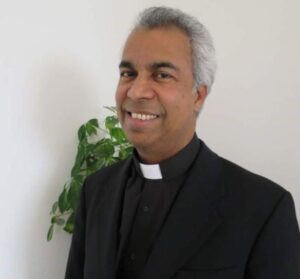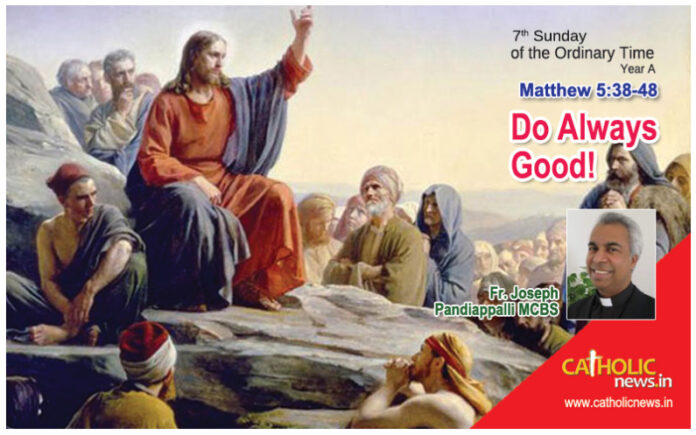
Jesus speaks against the Jewish concept of Justice which considered eye for eye and tooth for tooth. If someone damages the right hand justice should be established by damaging the right hand of the culprit. With this kind of punishment the injury will not be healed, instead the injury and offence will be doubled. If the punishment would be to do good work the result would be the welfare of the fellow human beings. If the idea of justice depends on the norm of ‚eye for eye and tooth for tooth‘, it is no more justice. It is wickedness which Jesus denies. Jesus recommends good work against the evil and the wicked.
Jesus says; “But I tell you, do not resist an evil person. If anyone slaps you on the right cheek, turn to them the other cheek also. And if anyone wants to sue you and take your shirt, hand over your coat as well. If anyone forces you to go one mile, go with them two miles“ (Mt:5:39-41).
For our many fellow humans t is difficult to understand this teaching. It is difficult to practice this teaching too. Jesus does not claim that we will be able to convert wicked people through our virtuous behaviour. Instead Jesus compares such behaviour with the manner of the heavenly Father and invites us to be perfect as the heavenly Father is perfect. The reward for such deeds will be given in the heaven.
The reason to do good to the wicked is that we can not normally change the wicked. By doing good to them it helps to keep harmony and it does not give any chance for the evil to spread and become influential. Very often it is good to ignore the evil. Jealousy and any such malice will destroy the harmony of the human as individual and as community.
A small story of Fjdor Dostojewski will help to explain it. Once there lived a lady who was very wicked. On a day she died. She had done not even a single good work in her entire life. The angels came and sent her to the hell. But her guardian wanted to help and save the lady. It thought whether it could remember even a single good work of this lady in order to recommend her to God. Something came to the mind of the Angel as an idea and told God that this lady had once donated a onion from her veritable Garten to a beggar. As the Angel repoted it God told the guardian angel to bring the same onion and extend it to the fire and let her climb up through the stem of the onion. If the stem cracks she would fall into the hell back and she should then remain there for ever. If the stem does not crack and she manages to climb up to the top, then she can enter into heaven. The angel was very careful to inform the lady everything in detail and allowed her to start climbing. The lady managed to climb up almost till the top. But she saw then that together with her many inhabitants of the hell climbed up with the hope to escape from the hell together with this lady. As the lady saw it, she was angry and pushed others into hell with her feet and said that her guardian angel wanted to take her alone from the hell and not all these inhabitants to escape with her. She repeated that it was her onion and not their onion. As she said it with anger and pride, the stem of union broke into two and the lady fell back to ocean of fire and got burnt. Till today she remains there and the angel was very sad, fell tears from its eyes and returned.
The wicked lady could be actually happy about the fact that with her and with the help of her onion hundreds of souls could be saved from the hell. Instead of such a happiness she was egoistic, greedy and angry and she wanted to help nobody. She could not accept that her fellow human beings benefit something through her. With this attitude she lost her own possibility to get saved. The story tells us that nobody can live for it alone. The wicked will fall through there own wickedness.
Therefore the message of Jesus could be summarised in two phrases: first: love God and the fellow humans. Second: Do good to every one. The second is included and presupposed in the first: that is love.
Fr. Joseph Pandiappallil MCBS



